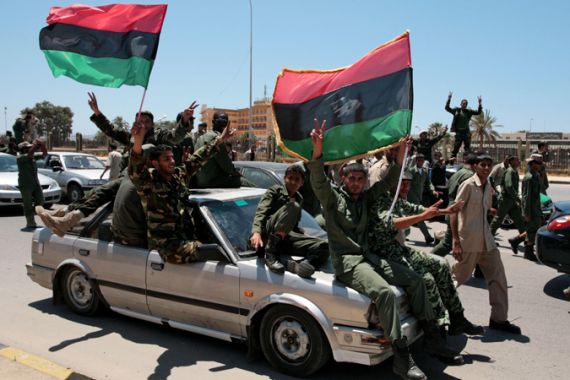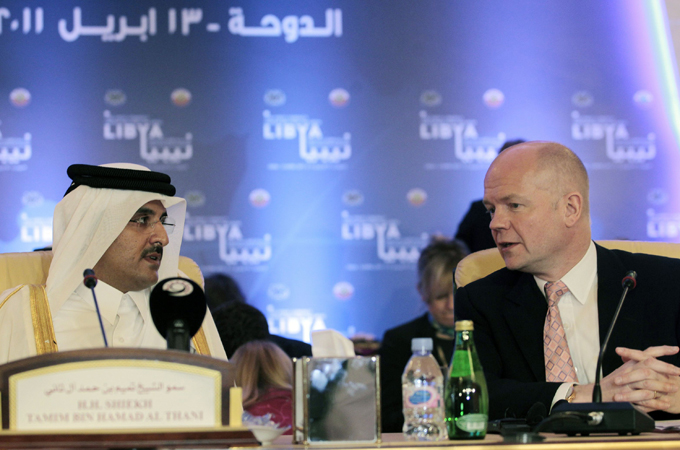Libya Contact Group meets in Abu Dhabi
Conference to discuss what post-Gaddafi country will look like as pressure continues to mount on the Libyan leader.

 |
| The first Contact Group meeting, to plan a democratic post-Gaddafi Libya, was held in Qatar two months ago [Reuters] |
The International Contact Group, which has been entrusted with the planning for a democratic Libya after Muammar Gaddafi, are meeting in Abu Dhabi for their third meeting since the organisation was launched in Qatar two months ago.
Thursday’s talks in the UAE capital come after Barack Obama, the US president, said that NATO’s mission in Libya was forging “inexorable” advances that meant it was only a matter of time before Gaddafi departed.
Due to take part are two dozen countries, including key NATO allies Britain, France and Italy, as well as delegates from the UN, the Arab League, and the Organisation of Islamic Conference.
The UAE also plans to invite Egypt, Saudi Arabia and Russia, US officials said.
The international community has begun to talk among themselves and with the rebel administration about how to offer security and basic services to the people of Tripoli when the Libyan capital is liberated, he said.
The developments come as the Libyan government faces accusations by the International Criminal Court (ICC) of using rape as a weapon of war.
Luis Moreno-Ocampo, the ICC’s chief prosecutor, told Al Jazeera said he is investigating allegations that Gaddafi officials provided soldiers with drugs to enhance their sex drive.
Post-Gaddafi Libya
As the military, political and economic pressure mount on Gaddafi to step down, the Contact Group will discuss “what a post-Gaddafi Libya ought to look like,” a senior US official told reporters on condition of anonymity.
Such a place should be a “unified state, [a] democratic state with a smooth transition”, the official said.
A second official said the rebel Interim National Council (INC) has set up shadow ministries in its base in eastern Libya and named a civilian to head military, in preparation for assuming power when Gaddafi falls.
|
|
However, the official said that the US cannot say whether the INC “is ready to assume complete control”, and cautioned that there is no international consensus over when Gaddafi should leave power, where he should go, or even whether he should leave Libya.
“And we in the international community have stepped up our effort as well to be able to be in a position to provide them (the opposition) whatever kind of assistance they might need,” the second official said.
A third US administration official said the Contact Group – which includes NATO allies leading the military action against Gaddafi as well as Arab partners and the UN – will discuss the opposition’s stark need for funds.
The opposition has complained that little has happened since the group last met on May 5 in Rome when Hillary Clinton, US secretary of state, and her partners agreed on a new fund to aid Libya’s rebels and promised to tap frozen assets of Gaddafi’s government.
“We understand the INC’s frustration but again the international community isn’t going to let the INC go under financially,” the official said on the condition of anonymity.
The group will debate on Thursday a “mechanism” through which aid “can flow in a transparent and accountable manner,” the official said.
‘Some support’
The first official said the US is optimistic “some support” will flow from the Contact Group meeting in Abu Dhabi but was non-committal about whether congress was ready to free up assets frozen in the United States for the rebels.
The third official said “yes” when asked whether the US would urge Arab countries to offer more funds to the Libyan opposition.
Clinton arrived in Abu Dhabi on Wednesday for the meeting.
“With each meeting, international pressure is growing and momentum is building for change in Libya,” Clinton’s spokesperson, Victoria Nuland, said.
US officials said, meanwhile, that a Liberian-flagged tanker was scheduled to arrive on Wednesday at Barbers Point, Hawaii, with 1.2 million barrels of Libyan crude sold by the INC, apparently the first such oil delivery by the opposition.
It was not immediately clear how much the INC would earn from the sale.
Weeks of NATO-led air raids have so far failed to force Gaddafi out, but Obama, nevertheless, insisted in Washington that the Libyan leader was on borrowed time after four decades of iron-fisted rule.
Nuland said that participants in Abu Dhabi will also discuss political unrest in Yemen, Syria and Bahrain as well as efforts to sustain support for the democratic transitions in Egypt and Tunisia.
Misurata shelling
On Wednesday night, NATO launched more air raids on the Libyan capital, Tripoli, after thousands of Gaddafi troops advanced on and shelled the rebel-held western city of Misurata.
The offensive had followed a lull in NATO bombing of Tripoli on Wednesday, after 24 hours of some of the heaviest bombardments of the Libyan capital since air strikes began in March.
By the evening, loud blasts once again rocked central Tripoli and aircraft screeched overhead, resuming strikes.
It was not immediately clear what was targeted, however, NATO raids appear to be repeatedly pounding the same set of targets: the Gaddafi compound in central Tripoli, a series of government buildings and radar installations and military bases on the outskirts of the capital.
The alliance says the bombing aims to protect civilians from the Libyan leader’s military, which crushed popular protests against his rule in February, leaving many dead. The conflict has now become a civil war.